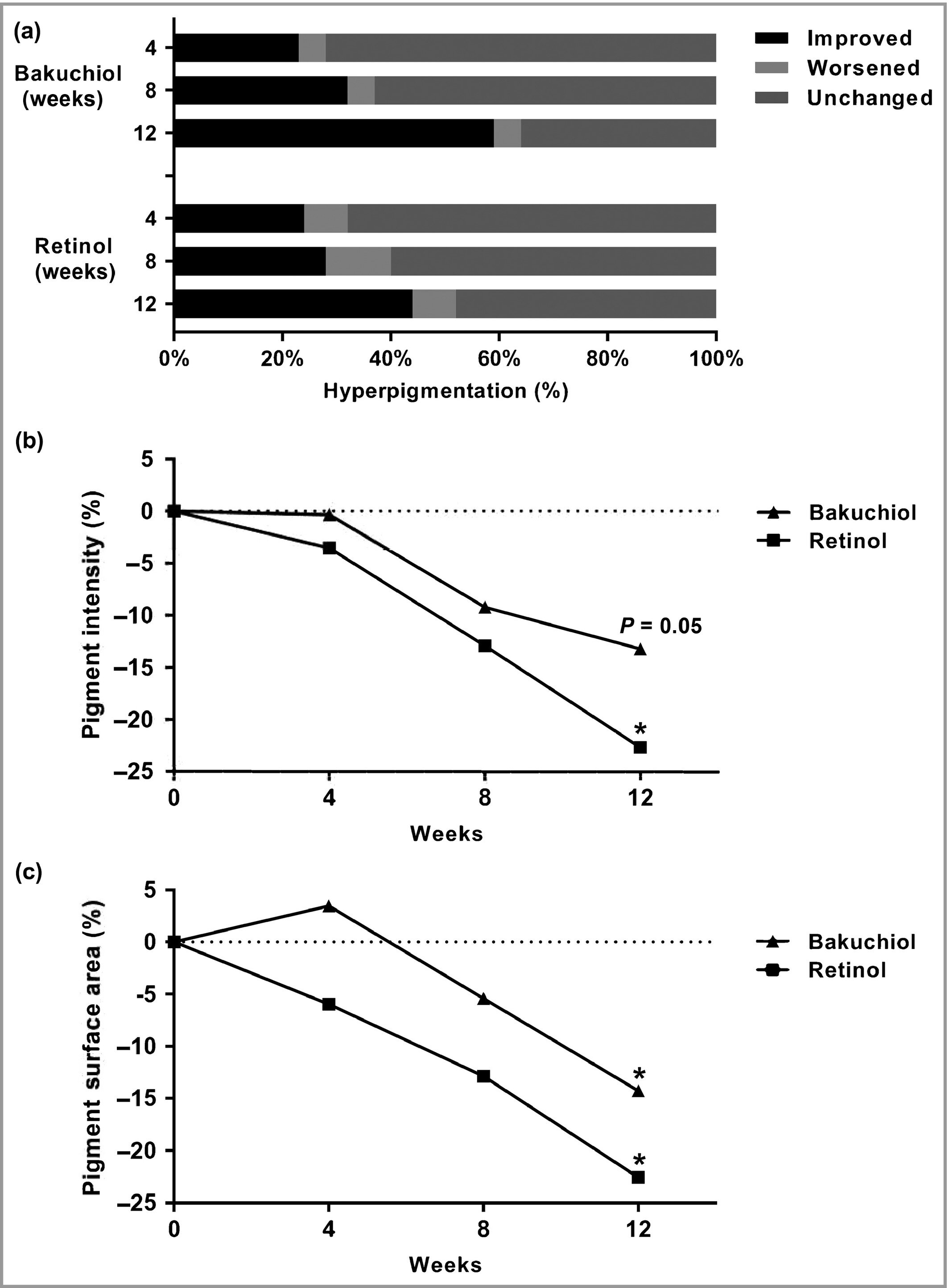What is bakuchiol, and is it everything it’s cracked up to be?
When I first heard of bakuchiol, I thought it was yet another skincare ingredient slash marketing ploy carefully crafted to draw in the “all-natural” consumer group. A plant extract that acts like retinol without side effects? It sounds too good to be true, and conveniently fits the bill for those looking for “clean” and vegan product alternatives.
I was fully prepared to scoff at this bakuchiol, until I read Lab Muffin’s take on it. I learned that unlike other nature-derived ingredients, bakuchiol’s skin care benefits have been quite extensively studied and proven. Okay, so maybe it’s not all buzz and hype! BUT is it really the next natural skincare superstar ingredient? Let’s take a closer look.
Psoralea corylifolia, or babchi plant. By Biswarup Ganguly, CC BY 3.0, image via Wikimedia Commons
What is bakuchiol and where does it come from?
Bakuchiol comes from the seeds and leaves of the Psoralea corylifolia or babchi plant. Although bakuchiol only started being used for skincare in recent years, the plant itself has been used for centuries in Ayurvedic and Chinese medicine! Believed to have anti-inflammatory, antimicrobial, and antioxidant properties, bakuchiol has been used both internally and topically to relieve skin diseases like psoriasis, vitiligo, and even leprosy.
Chemical structure of (a) bakuchiol and (b) retinol. Image via Wiley Online Library
Bakuchiol vs. Retinol
A quick review: retinoids are derivatives of vitamin A. They are best known as The Anti-aging Ingredient Of Choice because their ability to boost collagen production effectively combats fine lines, wrinkles, and sun damage. The most popular variant, retinol, is featured in many over-the-counter skincare products. Its more potent cousins, tretinoin and isotretinoin, are available only with a doctor’s prescription.
If retinoids are so good for the skin, why would you need a prescription to use them? Well, these are very potent ingredients and there are side effects to using them, so it’s best to consult a dermatologist to find the right one for your skin concerns and give instructions on how to use them safely and correctly. Regular use of retinoids is known to cause increased photosensitivity, dryness, and purging.
Several clinical studies published in the past decade have recommended studying the effects of bakuchiol vis à vis retinol, because the two seem to manifest very similarly on skin. Even though there are clear differences in the chemical structures of the two, it was clinically proven that the two induce similar gene expressions when used topically.
Science backs it up
Science rose to the occasion with an impressive 12-week clinical study called “Prospective, randomized, double‐blind assessment of topical bakuchiol and retinol for facial photoageing.” 44 randomly-chosen patients were asked to apply either retinol (once a day) or bakuchiol (twice daily). A dermatologist was tasked to assess the progress of the two groups, without knowing what each participant was using.
1(a) Changes in the clinical grading of hyperpigmentation in comparison with baseline were assessed at 4, 8 and 12 weeks. (b) Computer‐analysis‐based pigment intensity and (c) surface area were measured at 4, 8 and 12 weeks in both treatment groups. Image via Wiley Online Library
To make a long story short, the results confirmed other scientists’ hypothesis: bakuchiol did produce similar results as retinol, sans its negative side effects!
Before you buy
While the study brought about great news for everyone looking for a retinol alternative, there were a few caveats. Although it is true that bakuchiol did improve skin texture and pigmentation, it still isn’t as effective as retinol, let alone other retinoids like tretinoin or isotretinoin. Also, bakuchiol isn’t totally free of side effects, as increased redness is noted in the first few weeks of regular use.
While it is more ethically sourced (retinol comes from animal sources), some have warned that bakuchiol’s botanical origin makes it a possible allergen. It’s also important to note that adding bakuchiol to the ingredients list doesn’t make a product a retinol alternative. A 0.5 to 2% concentration of bakuchiol is needed to achieve the best results.
Bottom line: bakuchiol is an awesome anti-aging ingredient, provided that it doesn’t irritate your skin. Because it does have similar benefits as retinol, it might be a great way to kick off or supplement an anti-aging skin care regimen. If you’ve already found a retinoid product that works for you, don’t replace it with a bakuchiol product and expect the same results.
Ready to give it a go?
It’s only beginning to get traction as a must-have ingredient so brand choices are still a bit limited. Fortunately, there are a few bakuchiol products that are available locally if you want to give it a whirl!
The Inkey List Bakuchiol, P690/30ml at Sephora PH; P750/30ml at Beauty Bar
If you’re in the market for a moisturizer, this one just might hit the spot. This seems to be a great choice for those with dryer skin, as it also contains squalane and sacha inchi oil. Bakuchiol is listed 7th out of 19 ingredients - a good place to be considering its ideal concentration. It gets brownie points from me for its tube packaging and fragrance-free formula!
The Inkey List Bakuchiol Ingredients: Aqua (Water/ Eau), Squalane, Glycerin, Propanediol, Plukenetia Volubilis Seed Oil (Sacha Inchi oil), Dicaprylyl Carbonate, Bakuchiol, Phenoxyethanol, Sodium Caproyl Prolinate, Hydroxyethyl Acrylate/Sodium Acryloyldimethyl Taurate Copolymer, Carbomer, Sodium Hydroxide, Ethylhexylglycerin, Sodium Stearoyl Glutamate, Polysorbate 60, Phytic Acid, Glyceryl Polyacrylate, Sorbitan Isostearate, Tocopherol.
BYBI Bakuchiol Booster, P935/15ml at Sephora PH
First off, I love that it clearly states that the formula contains “1% Bakuchiol + Olive Squalane.” And yes, that also works as the complete ingredients list! This is a great choice for anyone looking to supplement an already solid skin care routine. Facial oils are versatile as they can be used on their own, mixed with moisturizer, or even mixed with foundation and other makeup products! Props for using squalane as the carrier oil, as it works for both dry skin in need of moisture boost as well as oily skin that appreciates a quick-absorbing product. Totally adding this to cart!
BYBI Bakuchiol Booster Ingredients: Squalane (Olive), Bakuchiol
Herbivore Bakuchiol Retinol Alternative Smoothing Serum, P3,335/30ml at Sephora PH
How pretty is this lilac serum? While it does capitalize on bakuchiol being a legitimate retinol alternative, it lists bakuchiol fourth in the ingredients list. It also contains a host of other plant and fruit extracts that add more antioxidant power to the mix. My one qualm: Amethyst Extract. I mean, do we really need pulverized gemstones in a serum? It may yield that pretty lavender color, but I’m not sure it has actual skincare benefits.
Herbivore Bakuchiol Retinol Alternative Smoothing Serum Ingredients: Aqua/Water/Eau, Aloe Barbadensis Leaf Water, Glycerin, Bakuchiol, Leuconostoc/ Radish Root Ferment Filtrate, Vaccinium Angustifolium (Blueberry) Fruit Extract, Populus tremuloides Bark Extract, Gluconolactone, Amethyst Extract, Vaccinium Myrtillus Fruit Extract, Sodium Phytate, Tremella Fuciformis Sporocarp Extract, Melia Azadirachta Leaf Extract, Melia Azadirachta Flower Extract, Amino Esters-1, Coccinia Indica Fruit Extract, Solanum Melongena (Eggplant) Fruit Extract, Aloe Barbadensis Flower Extract, Lawsonia Inermis (Henna) Flower/Fruit/Leaf Extract, Ocimum Sanctum Leaf Extract, Ocimum Basilicum (Basil) Leaf Extract, Curcuma Longa (Turmeric) Root Extract.
Biossance Squalane + Phyto-Retinol Serum, P1,815/10ml and P4,475/30ml at Sephora PH
I find the most expensive bakuchiol contender to be a surprising mix of clinically-tested ingredients and botanical extracts. Tried and tested ingredients like niacinamide and sodium hyaluronate (a form of hyaluronic acid) are mixed with squalane, bakuchiol, and rosa canina (rose hip) fruit oil. I like that it is available in two sizes, as it’s easier to commit to a smaller size when first trying a product. It looks to be a good option for a serum that combines the best of both synthetic and natural skincare ingredients.
Biossance Squalane + Phyto-Retinol Serum Ingredients: Water/Aqua, Squalane, Niacinamide, Sodium Acrylates Copolymer, Bakuchiol, Sodium Hyaluronate, Rosa Canina Fruit Oil, Citrus Aurantium Amara (Bitter Orange) Peel Oil, Biosaccharide Gum-1, Yeast Extract, Soy Amino Acids, Lecithin, Hexylene Glycol, Ethylhexylglycerin, Caprylyl Glycol, Phenoxyethanol, Tetrasodium Glutamate Diacetate, Citric Acid, Linalool, Geraniol, Limonene.
So, will you give bakuchiol a go? Why or why not? Let me know if you’ve tried other products with bakuchiol already!
Cover image by Nicole Quindara. Product photos via Sephora PH.
Sources:
Khushboo PS, Jadhav VM, Kadam VJ, Sathe NS. Psoralea corylifolia Linn.-"Kushtanashini". Pharmacogn Rev. 2010;4(7):69–76. doi:10.4103/0973-7847.65331
Dhaliwal, S., Rybak, I., Ellis, S., Notay, M., Trivedi, M., Burney, W., Vaughn, A., Nguyen, M., Reiter, P., Bosanac, S., Yan, H., Foolad, N. and Sivamani, R. (2019), Prospective, randomized, double‐blind assessment of topical bakuchiol and retinol for facial photoageing. Br J Dermatol, 180: 289-296. doi:10.1111/bjd.16918







